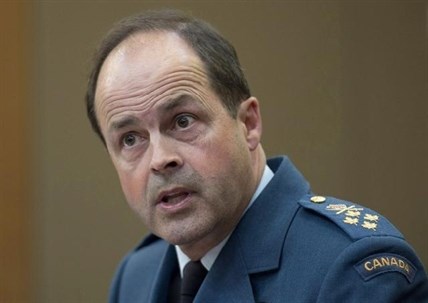
Gen. Thomas Lawson, chief of the Defence Staff, waits to appear at Commons defence committee hearing witnesses on sexual assault in the military, Tuesday May 27, 2014 in Ottawa. National Defence was told two years ago how to ease the backlog of investigations into military suicides, but the department chose to ignore the recommendation.
Image Credit: THE CANADIAN PRESS/Adrian Wyld
June 16, 2014 - 8:30 AM
OTTAWA - National Defence was told two years ago how to ease the backlog of investigations into military suicides — but the department chose to ignore the recommendation.
The department's director of special inquiries told officials in the spring of 2012 that the system could be improved by changing the agency responsible for the inquiries, newly released documents show.
The change involved moving the responsibility to conduct boards of inquiry from the overworked director of casualty support management to the chief of review services.
But the switch was "not deemed necessary" by senior officials, even though the number of unresolved cases continued to pile up and military families were — in some instances — left in the dark about circumstances that may have contributed to their loved one's death.
The Canadian Press obtained the documents under the Access to Information Act.
The lack of urgency to clear the backlog of investigations looks similar to the dawdling that went on within the bureaucracy over the long-promised plan to hire more mental health staff at defence.
Both issues became urgent priorities in the midst of the suicide crisis that gripped the military late last year and at the beginning of 2014.
Defence Minister Rob Nicholson called the country's top military commander on the carpet last January about the case backlog, and a memo written after that meeting shows the shift in responsibility for inquiries became an important concern.
There were, at the time, as many as 75 cases — some of them dating back as far as 2008.

Defence Minister Rob Nicholson answers a question during Question Period in the House of Commons in Ottawa on June 12.
Image Credit: THE CANADIAN PRESS/Adrian Wyld
Chief of Defence Staff Gen. Tom Lawson was compelled to assemble a special seven-person team to clear the backlog, according to internal email also released under the access law.
Only eight boards of inquiry remain in the review stage and the entire file of incomplete work will be cleared by early autumn, a defence spokesman told The Canadian Press.
Daniel Blouin explained the inaction by saying officials were more focused "on making the (board of inquiry) process more efficient" by changing the rules and reducing paperwork, such as creating a standardized form for the order to convene an investigation.
Responsibility for the investigations was formally transferred to the chief of review services on June 1, Blouin added.
The inquiries are internal, technical investigations that help the military determine whether its practises and procedures have contributed in any way to the death of a member.
Critics say that even though they are not military police or judicial investigations, the inquiries are important avenues for families to find closure, especially in the case of suicides.
Michel Drapeau, an Ottawa lawyer and military officer, said inquiries need to be taken out of the hands of the military altogether and handed over to a civilian coroner's inquest, as it's done in Britain.
The fact that the findings of military boards can be kept secret only strengthens the argument, said Drapeau, who represents the family of Cpl. Stuart Langridge.
Langridge took his own life in 2008, and his family has fought a pitched battle with the military to uncover the circumstances surrounding his death.
Lawson defended the handling of the cases in a Jan. 31 letter to Nicholson, saying that the "delays in closing these reports neither adversely affect the well-being of our men and women nor postpone addressing systemic issues that could arise."
He also felt compelled to underline for the minister that "in contrast to what may be suggested by the lengthy process for BOIs, I closely and immediately track any suicide or suicide attempt of a CAF member."
Like the case backlog, department officials did not treat the hiring of additional mental health workers as a priority, despite being singled out as a concern by the military ombudsman and receiving an additional $11.4-million from the Harper government to complete the job in 2012.
A series of internal department sources told The Canadian Press in a story earlier this year that repeated attempts to fill over 50 vacant positions were blocked by a combination of smothering procedure and the spillover effects of the federal hiring freeze.
Jacqueline Rigg, the senior civilian human resources manager at National Defence, told a Commons committee that they had to work with both the federal treasury board and the public service commission, telling both institutions: "Can you please give us a faster process to get this done because we can't wait."
Follow @murray_brewster on Twitter
News from © The Canadian Press, 2014